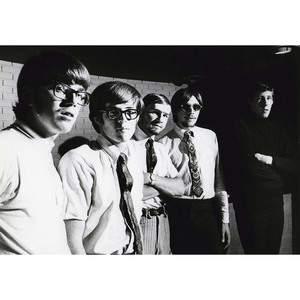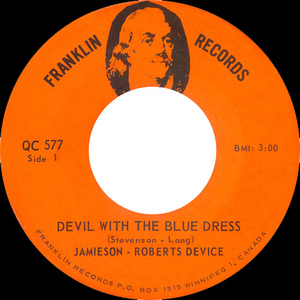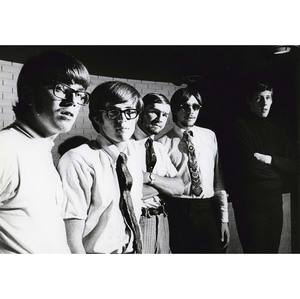Jamieson-Roberts Device
Websites:
https://www.winnipegfreepress.com/arts-and-life/entertainment/music/career-a-music-medley-381228961.html
Origin:
Winnipeg, Manitoba
Biography:
The Shags (Jamieson-Roberts Device) in 1967: Stuart Adams (from left), John Lidgey, Andy Pastor, Leskiw and Bill Merritt.
Though he is reluctant to accept the title, guitarist and singer/songwriter Greg Leskiw is a Manitoba music elder statesman. He has recorded in every decade since the 1960s, and his impact and influence on the music scene in general and on musicians in particular is extraordinary.
"I’ve stuck with it because I could," he muses from his Fort Garry home. "What a crazy bugger I was. I’ve dedicated myself to music. It’s nice to be respected for what you love to do."
Born in Brandon and raised in Shilo, Leskiw began playing guitar at an early age. He didn’t have to go far for lessons. "My dad played ’40s stuff, and that’s what I first learned," he says.
Joe Leskiw had played in several dance bands in and around Brandon, including the Syncopaters. While his contemporaries cut their musical teeth on Elvis and Chuck Berry, Greg played an entirely different repertoire.
"My roots weren’t in rock ’n’ roll," says Greg Leskiw. "I learned a lot of jazz standards, some of the songs that appeared on the first Swing Soniq album, like Moonglow. My dad taught me jazz chords, so I had learned augmented, diminished, sevenths, minors and how to play all over the fretboard. He taught me how to play in B-flat and E-flat, which were the horn keys, and a lot of those old songs were written in those keys. He was a good player, could improvise well and had a great sense of melody."
That solid grounding in jazz served him well throughout his lengthy career, allowing him to bring a unique style and sound to his rock music.
After high school, Leskiw moved to Winnipeg, where he hooked up with the Shags, one of hundreds of local bands all plying the same community-club and school-sock-hop circuit in the mid-1960s.
"I had already gotten into the Beatles back in Shilo with the Howie brothers, two local guitar players in Shilo," he says.
The Howie brothers later moved to Winnipeg to form the Action. With the Shags, Leskiw adopted the surname Venn. In fall 1966, the Shags recorded a 45 for local Eagle Records, operated out of the Country Music Centre on Selkirk Avenue, owned by Charlie Ward.
"Greg shared an apartment with Malcolm Braithwaite, Eaton’s display designer," recalls Warren Mills.
"Malcolm was my sister Barb’s boyfriend. Greg was hungry and broke and playing in the Shags. My mom made the mistake of inviting Malcolm and Greg to the family Sunday night roast beef dinner. Never saw a skinny guy eat so much in my life. She made up a bag of sandwiches, and Greg was all smiles. He then showed up for a bunch of Sunday dinners."
Personnel changes resulted in a name change to the Jamieson-Roberts Device, and a single recorded for Winnipeg-based Franklin Records, a cover of Shorty Long’s slow-struttin’ Devil with the Blue Dress On (not to be confused with the revved-up Mitch Ryder version). Ever the journeyman guitarist, by 1968 Leskiw was playing with Winnipeg’s best-loved hippie band: Logan Avenue Comfort Station, named for the public washroom on Logan just off Main Street. The band included bass player/vocalist Bill Wallace and drummer Craig Hamblin from the Gettysbyrg Address as well as guitarist Mark Freed. Decked out in headbands, tie-dyes, moccasins and beads, Logan Avenue Comfort Station played the music of Moby Grape, Buffalo Springfield, Cream and other psychedelic bands and was a favourite with the hippie crowd.
"That was one of the best little rock bands I was ever in," Leskiw says.
Again playing musical chairs, in 1969 Leskiw, Wallace and Hamblin hooked up with American guitarist Dickie Torrance from Bismarck, N.D.’s Tradewinds 5 (who played Winnipeg often) and added keyboard player Herman Frühm from the Brass Sermon. This short-lived combination took the defunct Gettysbyrg Address name and recorded one track, a Leskiw composition titled Baby True that ended up on the 1970 Franklin Records compilation album. By the time the album was released, Leskiw had again moved on, this time to Wild Rice, the folk group consisting of Bill Ivaniuk, Carol Isaacs and drummer Gord Osland. He was playing with that group in May 1970 when a phone call changed his life.
At the peak of their success, with American Woman at No. 1 in the United States, Winnipeg’s Guess Who ousted founding member guitarist Randy Bachman after a nasty confrontation in a New York hotel room.
"Kurt Winter and Greg Leskiw were the best guitarists in the city," recalled Burton Cummings. "We couldn’t decide which one to ask. Then, Garry Peterson suggested we get both of them." Both men received phone calls that same day from New York.
"I was pretty astonished when Burton called," Leskiw remembers. "It was a total surprise. I’d have had to have been a total fool to turn down an offer like that."
'I've been looking back at things I started over the years and never finished. It's time to finish them'‐ Greg Leskiw
For Leskiw, the decision was beyond his wildest dreams. "In one month, I went from a hippie guy making $50 a week to a rich guy playing the White House," he says.
He remains humble about his elevation to the rock star pantheon. "Thank God they took Kurt and me because there was no way I could have cut that job by myself," Leskiw says.
Logan Avenue Comfort Station outside the public washroom the band was named after: Leskiw (from left), Bill Wallace, Mark Freed and Craig Hamblin. The two guitarists complemented each other’s styles perfectly. "I was much happier with the new lineup," Cummings said, "because we all became better friends."
The band carried on without missing a beat as more hits and sold-out North American tours followed.
Initially, Leskiw found a home for his quirky songwriting style on the band’s albums while Cummings and Winter penned the big hits. Coming Down Off the Money Bag and Moan For You Joe signalled a uniquely individual approach.
"One Divided was a neat tune, but not for the Guess Who," he concedes. "And Grey Day was far from the band’s style, but they were nice enough to let me do it, probably against their better judgment."
But by the time of 1972’s Rockin’ album, he was starting to feel like an outsider.
"The door was open for me to write, but I was off to one side in terms of direction," he reveals. "I was getting frustrated that I really wasn’t coming up with stuff that would work for the band."
Growing tension within the band led Leskiw to abruptly quit after a gig in Corpus Christi, Texas, returning home in mid-March 1972.
"It was pretty emotional and difficult at that time," he says. "There was a fair amount of turmoil within the band. It just wasn’t fun. I got dropped into the Guess Who, but it still wasn’t my thing."
Taking time off to get himself together, Leskiw assembled a band capable of reflecting his own personal musical tastes, one where he could call the shots. Mood Jga Jga debuted the following year and instantly set the local music scene on its ear. The quartet — Leskiw on guitar and vocals, drummer Osland, former Shags bandmate Bill Merritt on bass and keyboard player extraordinaire Frühm, all former bandmates — drew on traditional as well as progressive jazz to concoct a heady brew of mellow pop-jazz.
"We were always pushing the envelope," says Leskiw. "It was our own concept of our sound. We wanted to be different, and it worked with the way I was singing."
In summer 1973, the group travelled to New York to record with producer Phil Ramone, renowned for his work with Paul Simon, Phoebe Snow and Billy Joel.
"We were looking for someone who had done some work in the jazz field and who was ready to step into pop to do some producing," recalls Leskiw. "Phil was the guy."
Working with Ramone remains a highlight. "He was walking musical history, won all those Grammys and awards, had just finished There Goes Rhymin’ Simon and working with Burt Bacharach, and here we were recording with the guy. I had written I Am What I Am What I Am just before leaving the Guess Who. I also had Gimme My Money."
He regards Daybreak as capturing the essence of what Mood Jga Jga represented. The hard-rocking Queen Jealousy was the debut single, propelled by Frühm’s stellar piano playing.
As for the unusual band name, Leskiw explains, "It came from Gordie’s son Sam. He was just a little guy. Around the dinner table one day, he was banging on the plates with his knife and fork, and he kept saying ‘Mood jga jga, mood jga jga’ over and over. And it stuck in my mind. It was tough to say, tough to spell, but there was something about it, the look of it. But everybody mispronounced it. We were at Warner Bros. records being introduced to everyone in the building as ‘Mood Jeegah Jeegah’ and we didn’t pick up on the hint: ‘Change your freakin’ name!’"
A brilliant synthesis of pop, rock and jazz, the eponymous album largely fell on deaf ears beyond Winnipeg. Reluctant to promote such an eccentric-sounding album, Warner Bros. left the record to suffer its own fate.
"The signs were there," Leskiw laments. "First of all, we had a delayed release. Then it was, ‘Let’s just release it in Canada.’ The record didn’t happen like it should, and then they decided to cut back their roster, and we were dropped."
One gig remains memorable, however. "We played a set in the nude at the Sandstone Club in L.A.," laughs Osland. "They called it a ‘sensual awareness club.’ It’s interesting playing drums naked. You gotta be kind of careful."
While critics at the time considered Leskiw’s Guess Who defection ill-advised, he has no regrets.
"If I had the choice between staying in the Guess Who or making music with Mood Jga Jga, there’s no question: it would be Mood Jga Jga."
Sessions for a follow-up album — financed by Leskiw and with Ian Gardner replacing Merritt — fell apart, and the band folded. They have reconvened several times in the ensuing decades and released a second album in 1997.
Before Mood Jga Jga wrapped up, the band had a weeklong booking at the Norlander Hotel on Pembina Highway. Leskiw and Frühm called on ex-Musical Odyssey members Marc LaFrance and Larry Pink, along with former Guess Who bassist Bill Wallace, to complete the gig. The five found this lineup invigorating and decided to stay together, and Crowcuss was born. With an ear toward the free-flight sonic excursions of jazz-rock fusion artists such as Herbie Hancock and the Mahavishnu Orchestra, Crowcuss became known as a musician’s band.
"Some songs would last 20 minutes, and we’d go through a huge amount of complicated time changes," say drummer LaFrance. "At rehearsals, they were calling out chords, and I didn’t know what the hell they were talking about."
Leskiw found the complex arrangements daunting at times.
"For me, it was a real challenge keeping up with guys who, musically, were someplace else," he says. "Were we a jazz-fusion band, a pop band, or a country-rock band? We had all those things going on at once."
Mood Jga Jga: Herman Frühm (from left), Gord Osland, Bill Merritt and Leskiw.
Prior to sessions for the band’s debut album in 1977, Leskiw bailed out.
"I just wanted to get back to having my own band again," he admits.
Following his departure from Crowcuss, Leskiw released a solo album called Be My Champion in 1979 he credited to LesQ. The album showcased a wide range of musical styles.
"I’ve always been considered eclectic," he says.
He assembled the LesQ band and set out on the road. The lineup remained fluid, with players coming and going until 1981, when guitarist Steve Heygi and drummer Harvey Kostenchuk (later replaced by Bob Brett) were joined by bassist Wallace. This lineup morphed into hard rock band Kilowatt. Signing to Toronto-based independent label Dallcorte Records, Kilowatt cut their self-titled debut album in Toronto with another Guess Who alumni, Domenic Troiano, producing. Released in 1982, Kilowatt was an impressive debut album of original material mostly from Leskiw, who also handled lead vocals.
"Rock ’n’ roll was loud and heavy then," he recalls, "and I was trying to work with that. I was trying to be a rock guy."
The album was well-received, with Kids Are Crazy released as a single. Fans came to appreciate the group’s no-frills rock, something few expected from Leskiw.
"It was hard work," he notes. "My voice would be shot after the fourth song. I was singing at the top of my lungs. Everybody was singing that way then, just belting from the top of their range. You had to because of the high-energy music. But it was unnecessarily loud, in retrospect."
Despite growing misgivings about the band’s sound, Leskiw soldiered on recording a second album, 1984’s Currents, only to have their record label fold.
"It wasn’t a happy ending. The wheels just started falling off the cart," he said. "It was recuperation time for me. I took a year off afterwards."
Operating his own recording studio, Vox Pop, in Fort Garry, Leskiw worked with dozens of young bands for the next 10 years. He also recorded a long-overdue second Mood Jga Jga album, Boys Will Be Boys. By 1997, he was ready for a change.
"I had nothing to lose and nothing going on," he says. "I always loved the old hot club swing, so I thought, ‘I’ve got to do that!’"
Teaming up with noted jazz guitarist Greg Lowe and double bassist Daniel Koulack, Swing Soniq, Leskiw’s dream band, was born. CBC financed the recording of the trio’s debut album. Released in 1998, Moonglow was a breath of musical fresh air, mixing standards such as the title song, After You’ve Gone, Beyond The Sea and I Can’t Give You Anything But Love with songs from his previous musical incarnations, including Once Divided, Gimme My Money, plus Kilowatt songs Ma Cherie and Step Aside. The album swung from start to finish.
"Acoustic guitar is my first instrument, and I’m back on it," Leskiw said at the time. "I mean, what’s a guy who idolized (gypsy guitar virtuoso) Django Reinhardt doing in a band like Kilowatt anyway?" Swing Soniq toured extensively playing the jazz-festival circuit and won the Cool Jazz FM competition in Winnipeg, with a prize of $15,000 to go toward sessions for second album, 2005’s Love Wild.
In 2006, Leskiw released an album of original rock songs recorded in his home studio back in 1990 under the title Hell on Hold, credited to One Eyed Jacks. Beginning in 2010, he turned his focus toward his songwriting, making five extended trips to Nashville to work with writers there.
"I had my Nashville dream like many other artists," he admits, "and I got to know the music community there. There’s a lot of roots music there. Some of my favourite times were at the Five Spot’s Wednesday night Hoot Nights. All sorts of artists would be there, everything from Django Reinhardt enthusiasts to traditional country music pickers. It was all acoustic, and you could join in with any of these small groups throughout the room."
Working with some of the top players in Nashville, he recorded dozens of demos he plans to finish in Winnipeg.
A recent health issue has given Leskiw pause to reflect on his lengthy career and motivated him to complete several unfinished recording projects. Earlier this year, the 69-year-old musician underwent quintuple heart bypass surgery at St. Boniface Hospital’s Asper Centre.
"I kind of kept it to myself," he admits. "I had blocked arteries. It was probably a problem for years, but I never went to a doctor earlier. It’s amazing what they did."
When the operating room staff discovered Leskiw was a former member of the Guess Who, they played No Time over the public address as he was being wheeled into surgery.
While he agrees he will forever be known for his time with the Guess Who, Leskiw has his sights set on the future.
"I know that when I die my obituary will start with ‘formerly of the Guess Who,’" he smiles. "It is what it is. I’m thankful for that period in my life, but that’s not all I’ve done. One of my friends calls me Mr. Formerly."
Leskiw is enjoying a new lease on life.
"I have to figure out how I’m going to spend the rest of my time on this Earth," he says.
"If I take care of myself, I could have many years ahead. I’ve been looking back at things I started over the years and never finished. It’s time to finish them."
-John Einarson



